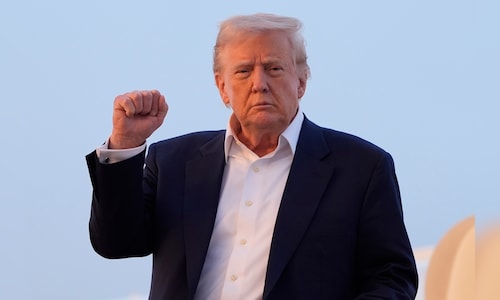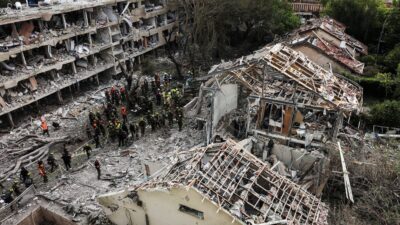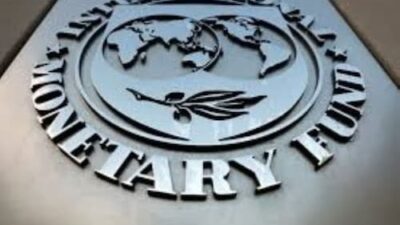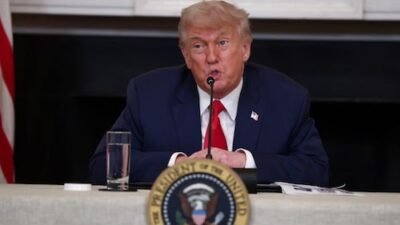Trump, who made this unexpected announcement on his Truth Social platform just days after authorizing airstrikes on Iran’s nuclear sites, noted that the agreement aims for a lasting cessation of hostilities.
“Assuming that everything proceeds as planned, which it will, I want to congratulate both Nations, Israel and Iran, for having the Stamina, Courage, and Intelligence to conclude what should be termed ‘THE 12 DAY WAR.’”
There was no immediate response from Iran or Israel following Trump’s statement. Vice President JD Vance mentioned that the president had been “working the phones continually” on Monday with the objective of securing an agreement.
The specific timing for when each side would halt combat operations was not clearly outlined in Trump’s post.
As Trump made his announcement, Iranian media reported significant explosions in Tehran and various other cities. Simultaneously, Iran’s Foreign Minister Abbas Araghchi stated that Tehran does not wish to escalate tensions but is ready to respond to any further US aggression.
This came shortly after Iran launched missiles at the Al Udeid Air Base in Qatar, which serves as the US Central Command’s regional headquarters, after assuring it would respond “proportionately and decisively” to recent US bombing of three nuclear sites. Qatar reported that the Iranian missile attack was intercepted and that the base had been evacuated beforehand. Trump expressed gratitude to Iran for the advance notice and the limited strike.
Oil prices fell due to relief that Tehran’s measured response suggested a potential easing of tensions in the conflict, which erupted 10 days ago when Israel attacked Iran’s nuclear and missile installations along with military leaders. Iran retaliated with several days of missile strikes against Israel.
After the attack on Qatar, Trump stated, “CONGRATULATIONS WORLD, IT’S TIME FOR PEACE!”
Speaking to Fox News following Trump’s ceasefire announcement, Vance remarked that the recent US bombing had achieved its objectives.
“We know they cannot develop a nuclear weapon,” Vance said, adding that Iran’s existing stock of highly enriched uranium was “buried” by the attack.
“If Iran is determined to pursue a nuclear weapon in the future, they will have to contend with a very, very powerful American military,” he asserted.
Iran’s actions on Monday appeared to be “a largely symbolic retaliation,” according to Ziad Daoud, Bloomberg Economics’ chief emerging-market economist. “Plenty of warning was given – Qatar shut its airspace, and the US had issued advisories to citizens.”
Some of Qatar’s Gulf Arab neighbors, including Bahrain, which hosts a US naval base, and the United Arab Emirates, also closed their airspace late Monday as a precaution. All these nations announced shortly afterward that their airspace was again open to traffic. Qatar, the UAE, and Saudi Arabia condemned the Iranian attack.
The US and its allies had been anticipating the strike, as reported by an individual familiar with Western intelligence assessments. US diplomatic missions had earlier advised residents in Doha to shelter in place.
Iranian officials also implied that the move held symbolic significance. The number of missiles fired corresponded to the number of bombs deployed by the US against the nuclear sites at Fordow, Natanz, and Isfahan, and the strike on Qatar “poses no danger” to a “friendly and brotherly country,” as stated by the state-run IRNA news agency.
Israel maintains that its campaign against Iran is aimed at preventing the country from acquiring nuclear weapons, a concern also raised by Trump to justify US involvement. Iran denies ever seeking a nuclear bomb.
In recent months, American and Iranian negotiators had engaged in multiple rounds of discussions aimed at crafting a new agreement to curtail Iran’s program — intended to replace the 2015 nuclear deal that Trump abandoned during his first term. A central sticking point in those negotiations was the issue of limited uranium enrichment on Iranian territory, which Tehran insists it is entitled to under international law, and which Trump seemed to dismiss.
Since Israel’s attack on June 13, Trump has fluctuated between military threats and indications of renewed diplomacy. His representative in the earlier negotiations, Steve Witkoff, has maintained contact with Iran since the US strikes. Tehran has stated that it won’t return to negotiations while under attack.



